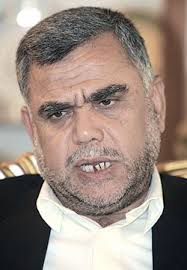Hadi al-Amiri
October 19, 2014
BAGHDAD — Iraq’s parliament voted Saturday to put an affiliate of an Iranian-backed paramilitary group in charge of a key security ministry, a move that could strike a serious blow to efforts to unite Sunnis and Shiites to wrest back their country from Islamist extremists.
The new interior minister is Mohammed Ghabban, a little-known Shiite politician with the Badr Organization. But there is little doubt that Hadi al-Amiri, head of the party and its military wing, will wield the real power in the ministry.
The Badr militia ran notorious Shiite death squads during Iraq’s sectarian war, after infiltrating the Interior Ministry. A leaked 2009 State Department cable said sources had indicated that Amiri may have personally ordered attacks on up to 2,000 Sunnis. Amiri has denied such allegations.
In addition to his militia activity, Amiri is a politician, having served until recently as transport minister. He has expanded his already extensive influence in Iraq since the country began to rupture in the wake of an advance by Islamic State militants this summer. He quickly swapped his suits for military fatigues and went to oversee military operations in his home province of Diyala, north of the capital.
In an interview last week at his villa in Baghdad’s fortified Green Zone, Amiri said his party had a right to receive a significant ministry after winning 22 seats in the 328-member parliament and repelling the advance of militants on Baghdad.
His party clinched the key security post despite vehement Sunni opposition. Ghabban’s appointment cements the Shiite militia leader’s — and Iran’s — influence over the country’s security forces. Iraq’s recently appointed human rights minister is also affiliated with the Badr party.
The Obama administration has been pressing Iraq to form an inclusive new government, believing that the Shiite-dominated government of former prime minister Nouri al-Maliki alienated many Sunnis, prompting them to support the radical Sunnis of the Islamic State group.
For weeks, Iraq’s new prime minister, Haider al-Abadi, had resisted nominating a Badr member for the Interior Ministry post, politicians close to him said, but under pressure from Amiri, he submitted Ghabban’s name to parliament.
"We fought for the solidarity of Iraq, for the unity of Iraq," Amiri said, sitting on a gold-rimmed chair in an expansive reception room. "We told them, 'This is Badr, you can choose anyone.’ We told them, 'Give us what we deserve.’ "
Amiri is despised by some Iraqis and idolized by others. His face adorns billboards across Baghdad, a sign of how his popularity has grown among some residents since the Iraqi government turned to his forces and other Iranian-backed militias to secure the capital as the army crumbled this year.
Within days of the fall of the northern city of Mosul to militants in June, Amiri traveled to Diyala to oversee operations, coordinating the army, police and the "public mobilization" — a paramilitary force made up of volunteers including his Badr militiamen.
"I left my ministry, I took my weapon and I went to fight," he said. "And I will not leave the jihad until I liberate all our land from Daesh," he added, referring to the Islamic State by its Arabic acronym.
Former death squads
When former Badr commander Bayan Jabr headed the Interior Ministry in 2005 and 2006, sectarian killings in Iraq surged as Badr death squads worked under the cloak of the police force.
The 2009 State Department cable, referring to that era, said that "one of [Amiri’s] preferred methods of killing allegedly involved using a power drill to pierce the skulls of his adversaries."
Still, the State Department on Saturday welcomed the naming of the interior minister and six other ministry chiefs as the culmination of the formation of an "inclusive" Iraqi cabinet.
Established in Iran in 1982, the Badr group was composed of Iraqi Shiite exiles who were trained, financed and armed by the Iranians to fight Iraqi President Saddam Hussein. The group relocated to Iraq in 2003 after the U.S. invasion that toppled Hussein. A Badr member has already been appointed to lead the Human Rights Ministry, raising questions about its level of accountability to the government.
"To give the Interior Ministry to a direct Iranian proxy is huge," said Phillip Smyth, a researcher specializing in Shiite groups at the University of Maryland. "It shows who the Iraqis are throwing their lot in with."
Amiri makes no secret of his close relationship with Iran — and squarely credits it with frustrating the Islamic State’s advances.
"If it wasn’t for Iran, Baghdad would have fallen," he said. "Iran supported us very well. They gave us weapons, they gave us ammunition, they gave us their military experience."
He jabbed his finger on a table for emphasis. "We are not ashamed of it," he said. "When our country is in danger, we’ll go to any country that will help us. Do you want us to wait for the Americans?"
He declined to comment on the extent to which the Iranians have been playing a command-and-control role in the fight against the Islamic State. Qassem Soleimani, the head of Iran’s elite Quds Force, has been photographed on the battlefield in Iraq. Amiri described him as a friend.
"When I was in Iran, we had a good relationship," he said of his years in exile. "We are proud of this friendship."
Diyala, where Amiri has been leading military operations, has been the scene of some of the most high-profile Sunni-Shiite violence of the current conflict, raising concerns about the impact of a Badr-controlled Interior Ministry.
Amiri denied that there are widespread sectarian killings there by militias.
He asserted that Diyala is an example for the rest of the country, with the Islamic State now expelled from all but a handful of its villages.
"The most important thing to me," Amiri said, "is to be a fighter, to defend my country, to plant terror in Daesh’s hearts."
Mustafa Salim contributed to this report.
Source
|

















